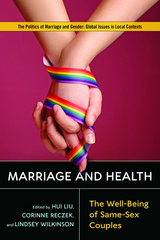Trans Studies
The Challenge to Hetero/Homo Normativities
Edited by Yolanda Martinez-San Miguel and Sarah Tobias
Rutgers University Press
Winner of the 2017 Sylvia Rivera Award in Transgender Studies from the Center for LGBTQ Studies (CLAGS)
From Caitlyn Jenner to Laverne Cox, transgender people have rapidly gained public visibility, contesting many basic assumptions about what gender and embodiment mean. The vibrant discipline of Trans Studies explores such challenges in depth, building on the insights of queer and feminist theory to raise provocative questions about the relationships among gender, sexuality, and accepted social norms.
From Caitlyn Jenner to Laverne Cox, transgender people have rapidly gained public visibility, contesting many basic assumptions about what gender and embodiment mean. The vibrant discipline of Trans Studies explores such challenges in depth, building on the insights of queer and feminist theory to raise provocative questions about the relationships among gender, sexuality, and accepted social norms.
Trans Studies is an interdisciplinary essay collection, bringing together leading experts in this burgeoning field and offering insights about how transgender activism and scholarship might transform scholarship and public policy. Taking an intersectional approach, this theoretically sophisticated book deeply grounded in real-world concerns bridges the gaps between activism and academia by offering examples of cutting-edge activism, research, and pedagogy.
A valuable contribution to the field … Trans Studies is an informative and stimulating read.
Winner of the 2017 Sylvia Rivera Award in Transgender Studies from the Center for LGBTQ Studies (CLAGS)
This welcome new anthology brings into sharp focus one of the most productive contributions the field of trans studies has made to scholarship on sexuality and gender: revealing the extent to which dominant, naturalized constructions of the relationship between sexed embodiment and gendered subjectivity traverse not only the heteronormative world, but also much of feminism, queer theory, and other fields that study the creation of social hierarchy from bodily difference. Addressing such diverse topics as educational activism, policy reform, surveillance technologies, cinema, theater, narrative arts, migration, and social movements, Trans Studies ably demonstrates that the field it surveys has indeed arrived as an important new lens for understanding, interpreting and appreciating a wide range of human diversities.
A vital addition to the field of trans studies. Martínez-San Miguel and Tobias have curated a collection of rich new scholarship located in the spaces between trans, feminist, and queer studies.
Trans Studies brings together some of the most challenging and compelling recent work in the field of transgender studies. The collection includes voices from inside and outside the academy, and it makes activists' contributions central. The fact of this diversity makes the project extremely vibrant: it will have a broad appeal across disciplines and for activists and community members as well.
YOLANDA MARTÍNEZ-SAN MIGUEL is a professor of Latino studies and comparative literature at Rutgers University in New Brunswick, New Jersey. She is the author of several books including From Lack to Excess: ‘Minor’ Readings of Colonial Latin American Literature and Coloniality of Diasporas: Rethinking Intra-Colonial Migrations in a Pan-Caribbean Context.
SARAH TOBIAS is the associate director of the Institute for Research on Women at Rutgers University, where she serves as affiliate faculty in the Women’s and Gender Studies Department in New Brunswick, New Jersey. She is the author, coauthor, or editor of numerous publications, including the book Policy Issues Affecting Lesbian, Gay, Bisexual, and Transgender Families.
Acknowledgments
Introduction Thinking beyond Hetero/Homonormativities
Yolanda Martínez-San Miguel and Sarah Tobias
Part I Gender Boundaries within Educational Spaces
Chapter 1 Creating a Gender-Inclusive Campus
Genny Beemyn and Susan R. Rankin
Chapter 2 Transgendering the Academy: Ensuring Transgender Inclusion in Higher Education
Pauline Park
Part II Trans Imaginaries
Chapter 3 “I’ll call him Mahood instead, I prefer that, I’m queer”: Samuel Beckett’s Spatial Aesthetic of Name Change
Lucas Crawford
Chapter 4 Excruciating Improbability and the Transgender Jamaican
Keja Valens
Chapter 5 TRANScoding the Transnational Digital Economy
Jian Chen
Part III Crossing Borders/Crossing Gender
Chapter 6 When Things Don’t Add Up: Transgender Bodies and the Mobile Borders of Biometrics
Toby Beauchamp
Chapter 7 Connecting the Dots: National Security, the Crime-Migration Nexus, and Trans Women’s Survival
Nora Butler Burke
Chapter 8 Affective Vulnerability and Transgender Exceptionalism: Norma Ureiro in Transgression
Aren Z. Aizura
Part IV Trans Activism and Policy
Chapter 9 The “T” in LGBTQ: How Do Trans Activists Perceive Alliances within LGBT and Queer Movements in Quebec (Canada)?
Mickael Chacha Enriquez
Chapter 10 Translatina Is About the Journey: A Dialogue on Social Justice for Transgender Latinas in San Francisco
Alexandra Rodríguez de Ruíz and Marcia Ochoa
Chapter 11 LGB within the T: Sexual Orientation in the National Transgender Discrimination Survey and Implications for Public Policy
Jody L. Herman
Part V Transforming Disciplines and Pedagogy
Chapter 12 Adventures in Trans Biopolitics: A Comparison between Public Health and Critical Academic Research Praxes
Sel J. Hwahng
Chapter 13 Stick Figures and Pronouns: Toward a Nonbinary Pedagogy
A. Finn Enke
Conclusion Trans Fantasizing: From Social Media to Collective Imagination
Yolanda Martínez-San Miguel and Sarah Tobias
Notes on Contributors
Notes on Contributors
Index

















